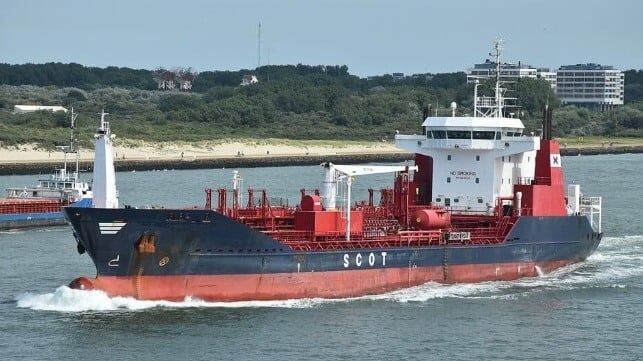Belgian Police Bust Cocaine Smuggling Attempt on Product Tanker

On Monday, authorities in Belgium seized a cargo of cocaine from a small tanker - along with eight men who may have been preparing to head out to sea to pick it up.
At about 2100 hours GMT last Friday night, the Turkish-owned product tanker Scot Bremen arrived off the coast of Ostend, Belgium on a voyage from Brazil. She anchored offshore for the next three days. At about 1500 hours on Monday, she got under way once more and put into port at Zeebrugge. On her arrival, customs agents found hundreds of kilos of cocaine on board, according to local media.
The case is believed to be linked to an arrest that local police accomplished on Sunday. That night, eight men were spotted launching a boat into the water at the Blankenberge marina, roughly 15 nautical miles to the southeast of where Scot Bremen was anchored at the time. All eight men were arrested, and an investigating judge in Bruges has ordered them held on suspicion of forming a gang.
So far, prosecutors have not specifically charged them with smuggling offenses, but Belgian news agency Belga reports that the men are suspected of attempting to head out to sea to retrieve cocaine - and their arrest led to the drug intercept aboard Scot Bremen.
Scot Bremen is a 2003-built chemical tanker flagged in Malta. Formerly Wappen von Bremen, she is one of eight specially-constructed sister ships acquired in 2015 by a Turkish shipmanager. The Scot Bremen usually trades between North America, Northern Europe and the Mediterranean, but this year she made two runs to the small port of Pecem, Brazil - one call in April and one more in early June, according to AIS data provided by Pole Star.
Brazil's biggest seaports are well-known as powerhouses of the global cocaine trade; the risk of smuggling at smaller ports like Pecem is also growing, local authorities say. Focused enforcement at the main hubs may be squeezing criminal activity out into regional ports, according to Brazil's Federal Revenue Service.
"While larger port complexes such as Santos, Paranaguá, and Rio de Janeiro rank among the top exporters of cocaine . . . all Brazilian ports – regardless of their location and size – are susceptible to varying degrees to the actions of sophisticated and powerful criminal organizations," warns P&I correspondent Proinde.
Top image: A SCOT-8000 tanker (Niels Johannes / CC BY SA 4.0)
